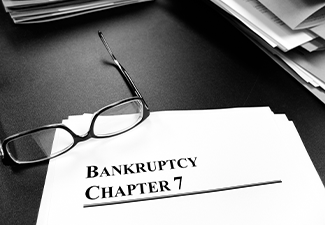Frequently Asked Questions About Chapter 7 Bankruptcy
Oct. 18, 2024
 When facing financial difficulties, many individuals consider bankruptcy as a way to regain control of their finances. Chapter 7 bankruptcy, in particular, offers a fresh start for those overwhelmed by debt. The Law Office of Scott N. Tisevich in Reno, Nevada, is dedicated to helping clients manage the challenges of bankruptcy with compassion and professionalism. He’s served clients from different areas, including Story County and Douglas County.
When facing financial difficulties, many individuals consider bankruptcy as a way to regain control of their finances. Chapter 7 bankruptcy, in particular, offers a fresh start for those overwhelmed by debt. The Law Office of Scott N. Tisevich in Reno, Nevada, is dedicated to helping clients manage the challenges of bankruptcy with compassion and professionalism. He’s served clients from different areas, including Story County and Douglas County.
What Is Chapter 7 Bankruptcy?
Chapter 7 bankruptcy, often referred to as “liquidation bankruptcy,” is designed to eliminate most unsecured debts, allowing individuals to start anew. In this process, a trustee is appointed to manage the debtor’s assets. Certain exempt assets can be retained, while non-exempt assets may be sold to pay creditors. The goal is to provide a clean slate, free from the burden of debt, which can be especially valuable for individuals struggling to keep up with their financial obligations.
Who Is Eligible for Chapter 7 Bankruptcy?
Eligibility for Chapter 7 bankruptcy depends on a means test that evaluates the debtor's income and expenses. If an individual’s income falls below the median income for their household size in Nevada, they typically qualify for Chapter 7. Those with higher incomes may still qualify, but they’ll need to demonstrate that they don’t have the means to pay back their debts. Scott N. Tisevich works closely with clients to assess their situation and determine the best course of action.
What Debts Can Be Discharged in Chapter 7 Bankruptcy?
One of the primary reasons individuals seek Chapter 7 bankruptcy is the ability to discharge various types of unsecured debts. Common debts that can be eliminated include credit card debt, medical bills, personal loans, and certain lawsuits. However, it’s essential to understand that not all debts can be discharged. For instance, student loans, child support, alimony, and certain tax debts typically remain after bankruptcy. Scott's office can help clients identify which debts can be eliminated and which will persist.
How Does the Chapter 7 Process Work?
The Chapter 7 bankruptcy process involves several key steps:
Credit Counseling: Before filing, individuals must complete a credit counseling course to help them explore alternatives to bankruptcy.
Filing the Petition: A petition is filed with the bankruptcy court, including schedules of assets, liabilities, income, and expenses.
Automatic Stay: Upon filing, an automatic stay goes into effect, preventing creditors from pursuing collections.
341 Meeting: This meeting, known as the “meeting of creditors,” allows the trustee and creditors to ask the debtor questions about their financial situation.
Discharge: If everything goes smoothly, the bankruptcy court will issue a discharge order, eliminating the eligible debts.
Scott N. Tisevich makes sure that clients understand each step, alleviating any fears they may have about the process. As your peace of mind is always the top priority, your concerns and questions will be addressed promptly, allowing you to focus on rebuilding your financial future with confidence.
How Long Does Chapter 7 Bankruptcy Take?
The duration of a Chapter 7 bankruptcy case can vary, but it typically takes about three to six months from the filing date to the discharge of debts. Factors such as the challenges of the case and whether there are any disputes can influence this timeline. Scott is committed to keeping clients informed throughout the process, providing updates, and answering any questions that arise.
Will I Lose My Property in Chapter 7 Bankruptcy?
One of the most common concerns about filing for Chapter 7 bankruptcy is the fear of losing property. While some non-exempt assets may be liquidated to pay creditors, many individuals can retain essential property, including their home, vehicle, and necessary personal belongings, thanks to Nevada's bankruptcy exemptions. Scott N. Tisevich works diligently with clients to identify exempt assets and develop a strategy that protects as much property as possible.
How Will Chapter 7 Bankruptcy Affect My Credit?
Filing for Chapter 7 bankruptcy will impact a person’s credit score, and it’ll remain on their credit report for up to 10 years. However, many individuals find that their credit score begins to improve after filing, particularly as they start to rebuild their financial lives. By making timely payments on remaining debts and managing new credit responsibly, clients can gradually recover. Scott emphasizes the importance of understanding the long-term benefits of bankruptcy, as it can ultimately lead to a more stable financial future.
Can I Refile for Chapter 7 Bankruptcy?
Yes, individuals can refile for Chapter 7 bankruptcy if they have previously filed and received a discharge. However, specific waiting periods apply: an individual must wait eight years after a Chapter 7 discharge before they can file for another Chapter 7 bankruptcy. Scott advises clients on the best approach if they're considering refiling, helping them assess their circumstances and plan accordingly. It's crucial to carefully consider the timing and implications of re-filing for bankruptcy, as it can impact your financial situation for years to come. Seeking guidance from a knowledgeable attorney like Scott can help you make informed decisions and take the necessary steps toward a more secure financial future.
What Are the Alternatives to Chapter 7 Bankruptcy?
For some, Chapter 7 bankruptcy may not be the best solution. Alternatives include debt settlement, debt management plans, and Chapter 13 bankruptcy, which involves a repayment plan. Scott's office provides a comprehensive assessment of all options, helping clients choose the path that best aligns with their financial goals and personal circumstances. By exploring these alternatives, individuals can make an informed decision that suits their specific needs and situations. Scott's experience in bankruptcy law allows him to guide clients toward the most beneficial option for their financial future.
How Can The Law Office of Scott N. Tisevich Help?
The Law Office of Scott N. Tisevich is dedicated to providing friendly and approachable legal assistance for individuals facing bankruptcy. Scott understands that financial distress can be overwhelming, and his goal is to empower clients with knowledge and support throughout the bankruptcy process. By offering personalized consultations, he sees that each client receives tailored advice and guidance suited to their unique situation.
Chapter 7 bankruptcy can provide a much-needed fresh start for individuals struggling with debt. According to statistics released by the Administrative Office of the U.S. Courts, bankruptcy filings totaled 452,990 in 2023 over 387,721 the previous year. If you’re planning to file, understanding the ins and outs of the process is essential for making informed decisions.
The Law Office of Scott N. Tisevich stands ready to assist clients throughout the state of Nevada, including those in Churchill County, Lyon County, Carson City, and Las Vegas. With a commitment to professionalism and a genuine desire to help, Scott is dedicated to assisting clients to do the right thing for their financial future.
If you have questions about Chapter 7 bankruptcy or would like to explore your options, don’t hesitate to reach out to Scott N. Tisevich for a consultation. Don't let financial challenges overwhelm you; seek guidance from a professional bankruptcy attorney to find the best solution. Take the first step towards a fresh start by scheduling a consultation today.
